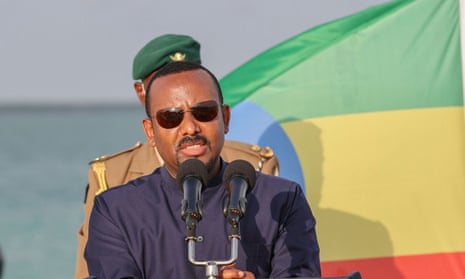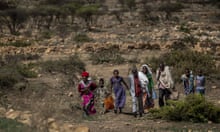The US, France and Germany have called on their nationals to leave Ethiopia immediately as the prime minister, Abiy Ahmed, vowed to lead his country’s troops “from the battlefront”, the latest turn in a devastating year-long war with rebel groups.
The Nobel Peace prize winner said in a statement posted to Twitter: “I will mobilise to the front to lead the defence forces. Those who want to be among the Ethiopian children who will be hailed by history, rise up for your country.”
Tens of thousands of people have been killed in the war between Ethiopian and allied forces and fighters from the country’s northern Tigray region. A de facto blockade on Tigray has triggered a humanitarian crisis and prevented the delivery of essential medical supplies.
In response to the worsening situation France, Germany and the US state department urged their citizens on Tuesday to leave on the first available commercial flight.
The Tigray People’s Liberation Front (TPLF) rebel group have continued to press towards Addis Ababa, claiming control of the town of Shewa Robit, just 220km north-east of the capital by road.
The US and others have warned that Africa’s second-most populous country could fracture and destabilise the whole Horn of Africa.
Abiy was awarded the Nobel Peace prize in 2019 after he signed a deal to end a nearly 20-year military stalemate with Eritrea after their 1998-2000 border war.
But last November he sent troops into Ethiopia’s northernmost Tigray region to topple the TPLF, saying the move came in response to TPLF attacks on army camps.
Though he promised a swift victory, by late June the TPLF had regrouped and retaken most of Tigray including its capital, Mekelle, prompting the federal army to largely withdraw from the region.
Since then the TPLF has pushed into the neighbouring Afar and Amhara regions.
It has also formed an alliance with other insurgent groups including the Oromo Liberation Army (OLA), which is active in the Oromia region surrounding Addis Ababa.
Fears of a rebel advance on the capital have prompted several countries including the US and the UK to pull out non-essential diplomatic staff.
These countries are also urging their citizens to leave Ethiopia while commercial flights are still available.
In a year’s time, Abiy’s government has gone from describing the conflict as a “law enforcement operation” to an “existential war”.









